• 402. Caroline to Schelling en route to Munich: Würzburg, 21 April 1806 [*]
[Würzburg, Monday] 21 April [1806]
|423| Must I really write you now? Let me go ahead so I will get into the habit. As long as I know you are still en route, and still exposed to this sharp air, I get no peace for thinking about my friend, whom as far as I am concerned not even a single, trifling waft of such air should disturb.
I can imagine you having actually arrived tomorrow at earliest. The moment does seem not entirely unfavorable insofar as you will probably find everyone there in a good mood because of the solidification of the peace accord, the vacating of Cattaro, the vacating of Germany, etc. At least that is what the newspapers are telling us. [1] —
Köhler did not tell me anything particularly sensible |424| about you. I, of course, wanted to know absolutely everything after the morning and evening had already turned into a frightfully long day in my story of — not creation, but annihilation, during which he was with you and I was not. [2] In his place, I certainly would have had considerably more to relate. He, however, had become quite wild after coming home and finding Der Freimüthige there with the notice he submitted about the lecture, and this modest influence he managed to exert on the outside world utterly filled him with enthusiasm. [3]
Good Sturmfeder had already been at Schott’s and had sympathetically related to him how poor Köhler had been treated very ill indeed. [4] By contrast, Klein thought he had been treated considerately — Although it has now been revealed to him, he is unable to come to terms with it. Köhler is now dead set on having the lecture published, but I will not allow anything to happen without you.
Der Freimüthige also contained various things about Würzburg that you would do better to read for yourself — apparently by Fischer — namely, about how the fact that you and Paulus declined to take the oath was noted quite disapprovingly in the highest quarters, about how there was no legal justification for it, etc., but nothing contra or about you, [5] though an immediate cry of murder concerning the review of Gall, which was called puerile and unsophisticated, and concerning the Halle Literatur-Zeitung, which allegedly is plummeting to the point of occasionally even being comical, e.g., Schlegel’s “Elegy.” [6]
And really, the little man is infuriated to the point of being comical himself. “When will a real Academy of Science and the Humanities finally publish a Literatur-Zeitung!” Please do give him the pleasure of this joke there. [7]
The enclosed from Walter [8] arrived after being en route for a long time, since he sent it by way of Fuld[a]. [9] I am sending it along because you probably do need to send him some sort of news concerning it. I will keep the treatise here; it seems to be a rather precieux piece. [10]
|425| The Leipziger Zeitung [11] contained the following: “Herr Professor Schelling left Würzburg after the students presented him an offering of impressive ceremonial music on the evening of 24 March.” Otherwise nothing. Even here, people do not seem to know what it is you want. [Business matters.] [12] Sturz, too, can imagine no greater délice [13] than that Würzburg be Bavarian. He has come down sick, perhaps out of sheer aggravation, for it is true, the citizenry is quite crazy and are constantly parading past his logis with their drills. [14]
Yesterday the city reverberated the entire day with war drums, people marched in and out and presented music by torchlight almost till morning. Hutten and Gross also dressed their sons in little generals’ uniforms; they look like Seebach and his boy as large and small music directors. [15] The entire group paraded down the Neubaugasse yesterday and offered a salute to our neighbor, the president. The lady doubtless had utterly no idea what to do with herself out of sheer delight. [16]
I had a bad day yesterday, one of my most violent headache days, messing up all my wonderful plans to go out into the world and look around a bit. My more contemplative spirit, however, was not entirely bowed. The first two days you were gone, I caught a cold, in part because the loving warmth of your presence was withdrawn, and in part because I had so many things to do here in the house. The maidservant is behaving quite well; yesterday evening she told me a bit about Eichstädt, where I thought you would probably be at that moment. [17] Today I again received a letter from Hières; it truly must be as beautiful there as one imagines. [18] But just get on with your trip and remain healthy.
Nothing yet from Marcus. From a letter that just arrived from Fritz, [19] I see that Mehmel had an invitation to the Liebeskinds. [20]
|426| Ask not how I am actually living, but neither worry about it. If I have spoken approximately as much during an entire day as I usually do, during the evening it seems to me that I have in fact been completely silent. —
Tomorrow I will be going over to the Martinis, whom I was planning to visit on Saturday, but she was engaged, and she sent me an invitation yesterday. Security is probably not really an issue [21] — everything upstairs is closed off, we are living solely in my étage, [22] and Blank has also offered me his chivalrous protection.
Stay well, my heart, my soul, my spirit, indeed my will. I am keeping your picture with me, and speaking with it. [23]
Notes
[*] Schelling had departed Würzburg for Munich on Friday, 18 April 1806, but had not yet arrived, as Caroline remarks in the course of this letter (Rudolf Koch and Fritz Kredel, Deutschland und angrenzende Gebiete [Leipzig 1937]):

[1] Events did not develop quite as Caroline and many others anticipated. In 1805, Cattaro (modern Kotor), a coastal town with a sheltered harbor on the Adriatic in Montenegro just south of Dubrovnik (Raguse/Ragusa) and across the Adriatic from the foot of Italy, was assigned to the French Empire’s client state the Napoleonic Kingdom of Italy by the Treaty of Pressburg, but occupied by Russian troops until after the Treaty of Tilsit in 1807 (J. B. Tardieu, Carte du Golphe Adriatique et de l’Archipel pour servir au Voyage de la Troade [Paris 1820]; Bibliothèque nationale de France, département Cartes et plans):
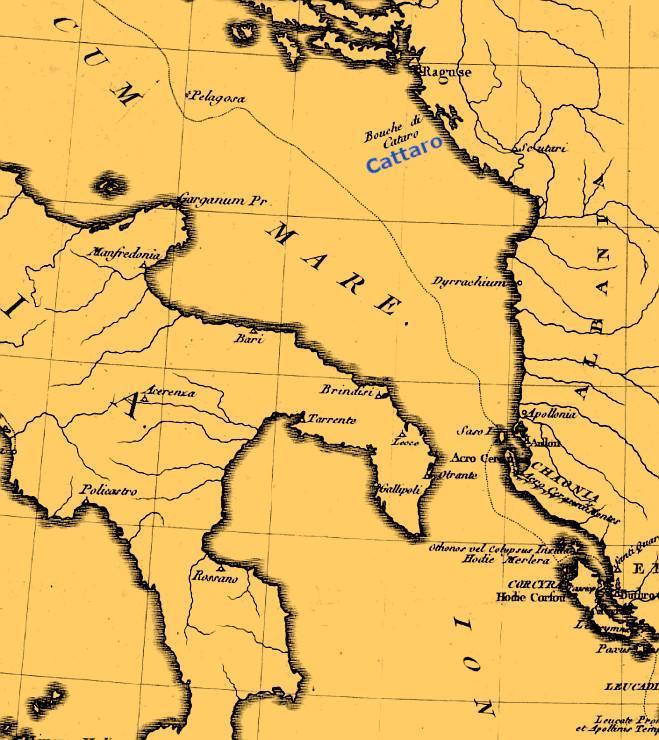
Concerning the complicated course of events, see C. H. Gifford, History of the Wars Occasioned by the French Revolution from the Commencement of Hostilities in 1792 to the End of the Year 1816, 2 vols. (London 1817), 2:504–5:
Cattaro, a small barren province, situated to the south of Ragusa, derives its value from the excellence of its harbour, which is the largest and safest in the Adriatic; and from the skill of its seamen, who form the chief part of its population. This province was one of those transferred to France by the peace of Presburg, by the articles of which it was stipulated, that France should take possession of Cattaro within six weeks after the exchange of the ratification of the treaty.
At the expiration of that period, the French officers appointed to receive the province from the Austrians had not arrived at Cattaro. An agent of the court of Russia at Cattaro took advantage of this delay, and succeeded in persuading the inhabitants, who are chiefly Greeks, that France having failed to take possession of the place at the time appointed, Austria was released from the obligation of maintaining it, and justified in withdrawing her troops and leaving it to the first occupant.
This reasoning, though satisfactory to the inhabitants of Cattaro, made no impression on the Austrian commandant, who occupied the forts with a garrison of 1,500 men, till supported by the irruption of a band of Montenegrins from the mountains, and by the arrival of a Russian line-of-battle-ship from Corfu.
The Marquis de Ghisilieri, commissary-general of the Austrian army, appointed to deliver up Dalmatia and Cattaro to the French, happened, at that moment, to arrive at Cattaro, whither he had preceded the French generals, on hearing of the mutinous spirit of the inhabitants; but, instead of resisting the Russians and their allies, as with the garrison in the forts he might easily have done till the arrival of the French, he consented, after a short negociation, to evacuate the place, which was immediately occupied by the natives, and by them transferred to the Russians.
[Here an earlier (1688) view of the fortifications of Cattaro (Vincenzo Maria Coronelli, Disegno topografico del canale di Cattaro [Venice 1688]; Bibliothèque nationale de France, département Cartes et plans):]

This strange transaction took place on the 4th of March [Caroline is writing on 21 April 1806], when the French were within a few days march of the place. The Austrian officers in garrison at Cattaro were scandalized at this proceeding, and so indignant with Ghisilieri, that they made a formal protest against the evacuation of the forts; and when the conduct of that officer came afterwards to be enquired into at Vienna, the reasons he assigned for giving up the place appeared so unsatisfactory to the tribunal before which he was tried, that he was dismissed from the imperial service, and sentenced to be imprisoned for life in a fortress of Transylvania.
The French, disappointed of Cattaro, with that profligate contempt of the rights of independent states which so strongly characterized the transactions of these times, took possession of Ragusa [26 May], to which they had no claim, on pretence of securing it against the incursions of the Montenegrins, who had not even threatened to violate its territory. The Montenegrins are a barbarous tribe of freebooters, inhabiting the chain of mountains adjoining to Cattaro, from one of which, called Monte-negro, they derive their name.
[Here Ragusa, Cattaro, and the mountains of Montenegro (Alfieri & Lacroix, Dall’Adriatico al Mar Nero [Milan 1916]; Bibliothèque nationale de France, département Cartes et plans):]

They were, at this time, in close alliance with the Russians, and, therefore, the occupation of Ragusa by the French, instead of protecting that republic from their violence, afforded them a pretext for invading and laying it waste. Several skirmishes ensued, in which both sides claimed the victory.
The French, however, were, in the end, compelled by the Russians and Montenegrins to shut themselves up in Ragusa, where they stood a siege of several weeks, while the Montenegrins ravaged the country and committed horrible excesses on the inhabitants. General Lauriston, who commanded in Ragusa, was at length relieved, July 6 [1806], from this embarrassing situation, by the arrival of General Molitor from Dalmatia, with a French army collected in that province.
It was now the turn of the Russians and Montenegrins to retreat, which, after the loss of their artillery and plunder, the former effected to their ships, the latter to their mountains, and in a few days the territory of Ragusa was cleared of these barbarians.
No event of importance followed till the month of September, when the Russians and Montenegrins having assembled in great force near Castel-Nuovo, General Marmont marched against them from Ragusa, and having enticed them, by a military stratagem, to quit their entrenchments, attacked and defeated them with great loss on the 29th [September]. But, notwithstanding this defeat, the Russians continued in possession of Cattaro and Castel-Nuovo at the end of the year.
Napoleon, in the meantime, nervous at the prospect of the terms of the Treaty of Pressburg not being followed to his liking, kept his troops in Germany and even reinforced them, keeping them in position, moreover, to march on either Berlin or Vienna. This situation, too, is reflected in Caroline’s earlier letter to Julie Gotter (letter 401) see note 9 there. Back.
[2] Martin Köhler’s seems to have spent part of the journey with Schelling, then returned to Würzburg. See below concerning Schelling’s route. Back.
[3] See the article, “Würzburg, 17 March 1806,” Der Freimüthige oder Ernst und Scherz (1806) 66 (Thursday, 3 April 1806), 264:
Several days ago, Herr Professor Wagner delivered several public lectures on Goethe’s Faust in which he discussed the value of this fragment and the overall disposition of the piece [“Faust. Ein Fragment,” in Goethe’s Schriften, vol. 7 (Leipzig 1790), 1–160].
A certain, well-known faction of professors and students were not quite satisfied with these lectures presumably because Professor Wagner did not blow the familiar trumpet of Goethe’s panegyrists and instead dealt with this topic from a genuinely critical perspective. Things went so far that several days later, a certain Professor Köhler announced that on 13 March he would deliver lectures “on the primary character in Goethe’s Faust.”
Since the lecture was public, there was no dearth of attendees; indeed, the hall was filled to overflowing, — and finally the lecture commenced! — and what was it to demonstrate? — That the famulus Wagner was the fragment’s main character! —
[Here Wagner (left) and Faust (right) in the latter’s study at the beginning of the play Goethe’s Works, ed. George Barrie, vol. 2 (Philadelphia 1885), 16:]
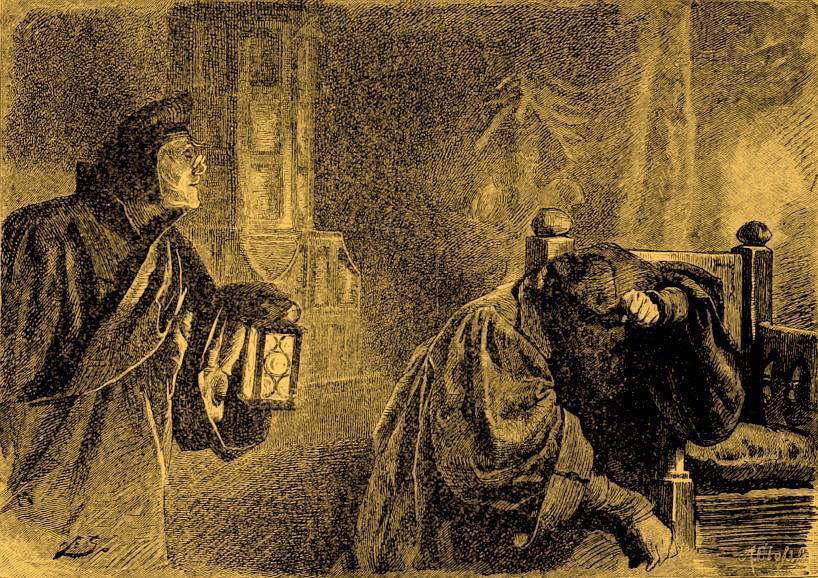
As high as expectations genuinely were in the auditorium, just as unsatisfied did the audience later disperse (much to the credit of the students here). Although Professor Köhler went to considerable trouble adorning his paradox with Tieckian wit, still no one quite comprehended what its real goal was. —
If it was supposed to be a parody of our beloved Herr Professor Wagner, then it succeeded quite ill. Most of those in the auditorium thought it was a satire directed at the audience itself, or, even more probable, a paradox void of any further purpose, which certainly seems plausible enough once one knows that this Professor Köhler is in fact an animated member of a faction whose grand merit is to say that it has no purpose.
He concluded the lecture by announcing that he would be publishing it, in which case subsequent criticism will likely not have the same patience demonstrated by the humane disposition of his audience, for whom his otherwise pleasing delivery at least made the thing tolerable. Back.
[4] Identity uncertain. The later Württemberg chamberlain Ferdinand Franz Georg von Sturmfeder (born 14 March 1788)? Schott is similarly uncertain; see Schelling’s letter to Windischmann on 17 April 1806 (letter 401f), note 4. Back.
[5] The latter statement is not quite true. See in any case the following missives to the Berlin periodical Der Freimüthige oder Ernst und Scherz.
“Aus Würzburg,” Der Freimüthige oder Ernst und Scherz (1806) 64 (Monday, 31 March 1806), 256:
The fate of the university and accordingly also of its professors, especially the Protestants, is still undecided. . . . Homage [to the new government] was indeed paid by the majority of professors, excepting only Messieurs Hufeland, Stahl, and Medicus, all three of whom will be filling vacant positions in Landshut; and, for unknown reasons, Messieurs Paulus and Schelling.
The latter’s refusal, however, has allegedly been noted in the highest quarters with considerable displeasure, nor, legally considered, can such refusal in any way be justified under the circumstances. Hence the other Protestants were exceedingly praised for having also acknowledged the new territorial lords . . . by continuing their lectures as well as their residency.
“Aus Würzburg,” Der Freimüthige oder Ernst und Scherz (1806) 69 (Monday, 7 April 1806), 275–76:
In general, it seems that all the Protestants are still entertaining hopes in the Bavarian government . . . What prompted Herr Schelling not to take the oath of homage has now also become known; it was nothing more than that he had already taken his leave.
By contrast, reliable sources relate that Herr Paulus was willing to take the oath only after being guaranteed his full salary of 2500 Fl. Since nothing of the sort could be guaranteed to either him or any of the other professors, and instead only the excuse presented concerning the provisional situation, he declared to the trustees that he would not commit, and then genuinely excluded himself from the solemn actus.
Whether, as has been alleged, he later did indeed turn in his subordination oath in written form and excuse his absence by claiming a sudden illness, is anyone’s guess. Otherwise it is reported that Herr Professor Paulus as well as Herr Professor Schelling will be traveling to Munich to pursue their acceptance into the academy [Bavarian Academy of Sciences and Humanities] there; several people also claim to know that Herr Schelling will instead be trying to secure a new professorial appointment in Landshut.
“Aus Würzburg,” Der Freimüthige oder Ernst und Scherz (1806) 76 (Thursday, 17 April 1806), 303–4:
By refusing to take the oath to the new government in Würzburg, Herr Schelling has surrendered his university sphere of activity. One should not have expected that the renowned philosophy of this absolutist would prompt him to exit the only theater where for a time he was yet able to maintain hope in philosophy from the ultimate perspective, namely, from the academic theater itself.
Young people, especially most of the medical students, for whom — thanks to the excellent secondary institutions! — everything that one throws up to them and calls “new” seems unprecedented, and to whom at the same time the most brazen and disparaging phraseology seems to be the most convenient for divine indolence, — Schelling might still have managed to win over such young people approximately in the first half of their university years to his method, a method that smothers any independent reflection through parroting and disorganized fantasies while precisely thereby utterly confusing young people as far as true study is concerned during the most decisive period.
Schelling might have succeeded in winning such young people, since his meteoric rise and acme have already passed, as he himself has noticed, as far as the rest of the public is concerned, and insofar as he is now simply disappearing among all the other specks of mist.
A good daemon has now brought about, quite unexpectedly, on behalf of university youth what even the most reserved judge of this absolutist could not but have wished for. For not even he flatters himself any longer with the possibility of some other university offering him an appointment or of even being permitted elsewhere to function as an instructor of youth. The question whether he wants a school of followers (Jahrbücher der Medicin als Wissenschaft ii [Sämtliche Werke 7:145]), will be answered quite on its own.
Given the publicly known declarations of the Bavarian government published by Der Freimüthige concerning the influence of his philosophy on students, would such an egotistical person not have accepted any possible offer, even had it meant returning to Jena? One wonders why in any case he did not make a sacrifice for the sake of his honor. The remnants of his followers took their leave of him with a precieux [Fr., here: “precious, affected”] serenade, and he from them with an affected eulogy of himself.
A serenade by a student choir for celebrities or chosen locals was also called a Kurrende; here such a serenade by a choir of younger boys on a later postcard at the Johannes town gate in Jena:
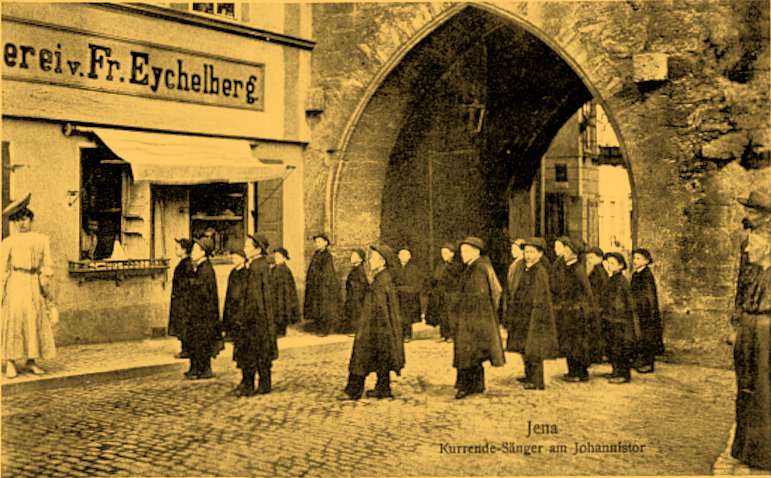
[6] Wilhelm Schlegel’s Rom. Eine Elegie (Berlin 1805), which he had written after his experiences in Rome with Madame de Staël, was reviewed in the Allgemeine Literatur-Zeitung (1806) 73 (Wednesday, 26 March 1806), 581–83. See “Aus Sachsen, 5 March 1806,” Der Freimüthige oder Ernst und Scherz (1806) 68 (Saturday, 5 April 1806), 272 (puncutation as in original):
The Allgemeine Literatur-Zeitung in Halle, which occasionally sinks to the level of the comical, recently published a truly comical review of Schlegel’s series of notes to which he has given the title “Rom. Eine Elegie.” It praises it far above Schiller’s “Götter Griechenlands” [1788; 2nd ed. 1804–5].
Although it does allow that Herr Schlegel is unable offer “anything new” and that he “merely touches” on the most promising topic namely, that of a comparison between ancient Rome, on the one hand, and papal Rome, on the other, those are mere trivialities, for — the reviewer was unable to discover “even a single trochee” in the entire poem. The poetic merit of avoiding trochees is indeed quite magnificent. By contrast, Schiller, in his “Götter Griechenlands” as elsewhere as well, paid little attention to whether he wrote spondees or trochees, and instead merely offered boldly poetical notions, almost nothing but new imagery. Hence how far beneath Herr Schlegel does he stand!
Meanwhile, the Jenaische Allgemeine Literatur-Zeitung, not wanting to fall behind in the department of nullity, has published a ten-column [correct: eleven], schoolboyish review of the writings on Gall’s doctrine of the skull, or rather of this doctrine itself [“Neueste Schriften über Gall’s Schädellehre,” Jenaische Allgemeine Literatur-Zeitung (1806) 71 (25 March 1806), 561–68; 72 (26 March 1806) 569–71], a review in which one does indeed find a great many insults and yet almost no ideas, a large number of assertions and yet not a single proof for any of them. —
The famous, erudite archaeologist Böttiger is derisively called an “educational director of pages,” and Gall a “dreamer,” etc. This — — — tone will in all likelihood not cease any time soon in German literature as long as scholarly criticism remains in the hands of such persons who consider themselves to be the oracles of the world because a few hundred students gape at them in wonder, everybody in their little provincial town takes their hat off when they pass, and other pedants of the same ilk pay them the occasional compliment. Will one of the real academies of science, by means of a grand, national undertaking on behalf of criticism commensurate with the true dignity of the sciences, not soon resolve to — — — — — — — — — — — — put an end to these Orbilii’s games? —
One sees how quickly schoolteachers, amid their educational tasks, if they are but up to those otherwise meritorious but enervating tasks, lose the flight of the spirit they learned as youths, and how quickly they forfeit, through eternal rehashing of what they learned as youths, how quickly they forfeit all sensibility for the greatness and global significance of the sciences and other scholarly disciplines, and begin taking their own tomfoolery for the essence of those endeavors. These men deserve empathy and consideration and respect as long as they are reasonable. But in Germany, a couple of factions of rigid schoolteachers are seeking to determine the course and even character of the entirety of literature quite according to their own private inclinations and disinclinations. —
Never, you Orbilii! for it has long progressed far beyond you.
Orbilii: From Latin, Plagosus Orbilius (plagosus, “full of, abounding in blows”), hence “Flogger Orbilius,” “Orbilius Fond of Using the Rod,” Horace’s affectionate nickname for his old schoolmaster (Epistles 2.1.70–71); the extended allusion is to the larger context in which Horace mentions Orbilius. In this passage, Horace criticizes excessive adulation of the ancients (The Satires and Epistles of Horace Done into English with Notes, ed. S. Dunster, 2nd ed. [London 1712], 361):
The People are sometimes right in their Judgment, sometimes in the wrong. If they are so infatuated in favour of the Ancients, as to think that none of the Moderns surpass them, or can even stand in competition with them, I must say, they are mistaken; but if they will allow, that their Poems contain many obsolete Words; that their Expressions are mean and low, and their Style uneven; I will readily join with them, they are right in their Judgment.
I wou’d by no means be thought to take from the Ancients, what is justly due to them; nor do I condemn Old Laevius’s Verses, I known their Value; my Master Orbilius, when I was a Boy, took such Care with his Ferula [ferule, a flat ruler used for punishing children] to explain them to me, that they will not easily be forgotten [memini quae plagosum mihi parvo Orbilium dictare]: But what I am most amaz’d at, is, that they wou’d impose them upon us for very correct Poetry. Back.
[7] Caroline cites from memory from the review above. The reviewer (“the little man”) is identified only as “R. L.” Back.
[8] Presumably Philipp Franz von Walther in Landshut. Back.
[9] Territorial changes and troop movements frequently made it necessary to send mail other than through the earlier, more direct postal routes (Neueste Post. Karte von Deutschland und den angrenzenden Laendern, ed. T. Molls [Vienna 1805]):
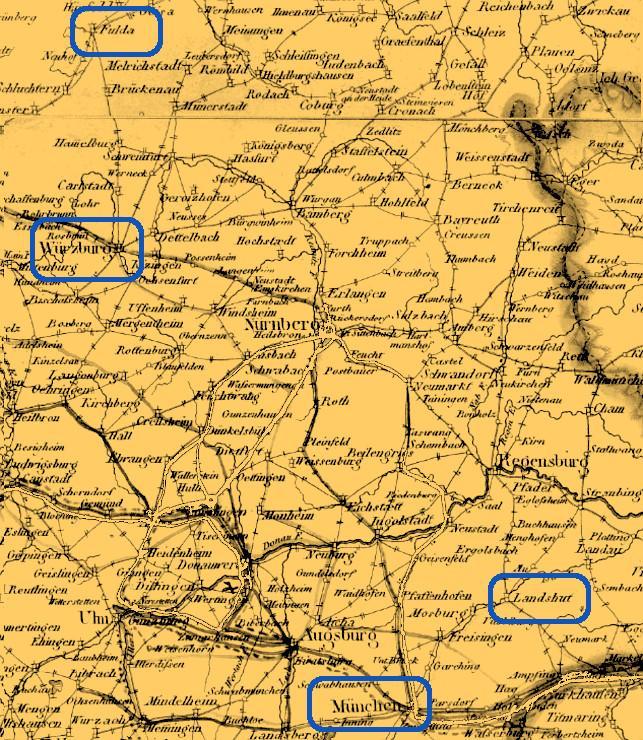
[10] Fr., here: “precious, affected.” Back.
[11] Uncertain issue and date. Back.
[12] Erich Schmidt, (1913), chose not to include this otherwise unspecified material. Back.
[13] Fr., “delicacy; joy, pleasure.” Back.
[14] Logis, Fr., “house, dwelling, lodging, accommodations.” — The processionals were anticipating the arrival of the new prince elector now that the Bavarians had withdrawn and Würzburg itself had passed to Ferdinand III, Grand Duke of Tuscany as a result of the Treaty of Pressburg. Back.
[15] Otherwise unidentified Würzburg residents and presumably officials. Back.
[16] The Seufferts are attested in 1806 as living directly across from the Schellings’ apartment, to wit, at Schulgasse 367; here a view of the two locations (Vollständiges Adreß-Buch der Churf. Haupt- und Residenzstadt Würzburg [Würzburg 1806], 60; map: Friedrich Harrach and Leonhard Zertahelly, Plan Der Kreis-Hauptstadt Würzburg [München 1845]; Bayerische Staatsbibliothek):

Or is Caroline referring to Christian Johann Baptist von Wagner and his young wife, Jeanette? In that case, Caroline may be making a bit of fun of the young bride, who was but seventeen years old at the time.
In any event, the Neubaugasse ran alongside the old university complex in which the Schellings lived such that Caroline might have viewed at least part of such processions from her third-story windows (see below; also the supplementary appendix on the Schellings’ residence in Würzburg; Kreishauptstadt Würzburg: Gemessen durch Carl Handwerk im Jahre 1832; Bayerische Landesbibliothek Online):

This view of Caroline’s apartment from 1780 shows the Neubaustrasse running alongside the Neubau church and Caroline’s apartment on the third story of the adjoining building to the left with a view of the Neubaustrasse itself; the illustration is incorrectly identified as “Augsburg” (Vue perspective de l’Universite d’Augsbourg fondé par l’Eveque Julien, colorized copper engraving [Paris (ca. 1780)]; the view on the original engraving is reversed for viewing in an early version of a viewmaster):
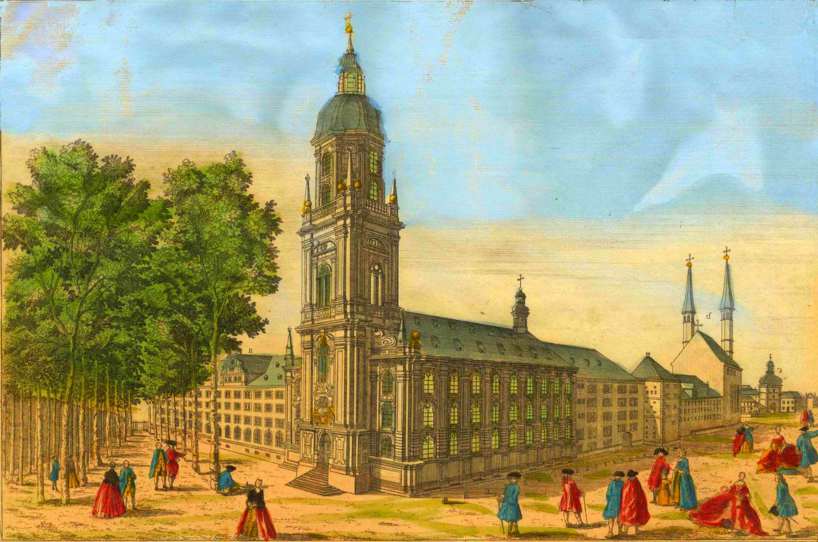
[17] Caroline remarks in her letter to Schelling on 25 April 1806 (letter 403): “You left Ansbach early Sunday morning [20 April] at 4:00 and were thus already secure in your lodging on Monday evening,” putting him in Eichstädt on the evening of 21 April 1806 (Neueste Post. Karte von Deutschland und den angrenzenden Laendern [Vienna 1805]; illustration: “Le coche de voyage du dix-huitiéme siécle,” in anonymous, “La locomotion terrestre: Les ancients coutures de voyage,” La nature: Revue des sciences etc. 16 [1888], premier semestre, no. 768 [18 February 1888], 177–79, here 177):


[18] The letter was certainly from her sister, Luise Wiedemann, who was in southern France with her husband.. Concerning the trip, see Caroline’s letter to Julie Gotter back on 1 December 1805 (letter 399), note 15.
The reference is to Hiéres on France’s Mediterranean coast; its extraordinarily pleasant climate was already attracting foreigners in the early nineteenth century, esp. those suffering from pulmonary illnesses, as was Wiedemann (Charles-François Delamarche, La France divisée en 32 gouvernements [1806]):
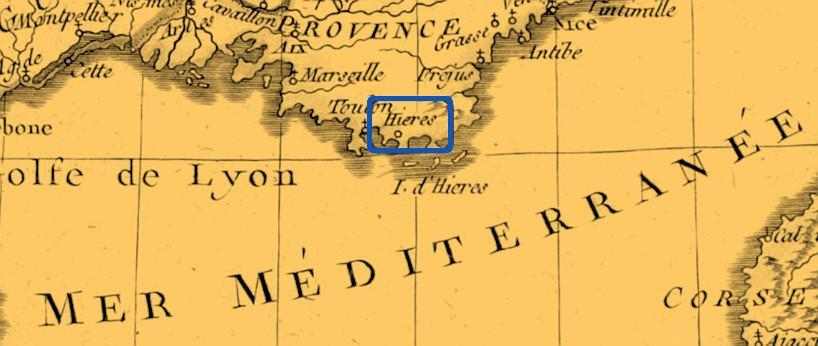
Here two postcard illustration from 1896 (F. Hugo d’Alési, Hyères [1896]; Bibliothèque nationale de France); it may be remembered that Caroline had been longing to journey to Italy for several years. and that descriptions of such southerly locales doubtless captivated her:

[19] Uncertain identity; unlikely Fritz Michaelis. Back.
[20] The Liebeskinds were living in Ansbach at the time. See Caroline’s letter to Meta Liebeskind on 27 April 1806 (letter 404), in which Caroline herself addresses the issue of traveling through Ansbach herself on her way to Munich (Neueste Post. Karte von Deutschland und den angrenzenden Laendern, ed. T. Molls [Vienna 1805]; illustrations: [1] J. Poppel, “Ansbach,” in Das Königreich Bayern. Seine Denkwürdigkeiten und Schönheiten, ed. Hermann von Schmid, vol. 1 [Munich 1875]; [2] Matthäus Merian [1648]):



[21] Caroline was now living alone in the apartment in Würzburg. Back.
[22] “We”: she and the maidservant. — Étage, Fr., “story, floor.”
The Schellings occupied the two stories above Schelling’s auditorium (second story), which in its own turn was above the university library; Caroline’s living quarters were on the third story, Schelling’s study on the fourth, which is why the “upstairs” had been closed off (here viewed from the north; Universität Würzburg, Universitätsarchiv; essentially the same illustration in R. Fick, ed., Auf Deutschlands hohen Schulen: Eine illustrierte kulturgeschichtliche Darstellung deutschen Hochschul- und Studentenwesens [Berlin, Leipzig 1900], 358):

The third story in the right wing in this photograph (Historisches Album der Stadt Würzburg. Zweiunddreissig photographische Ansichten, ed. V. Jos. Stahgel, introd. Franz X. Wegel [Würzburg 1867], illus. v):
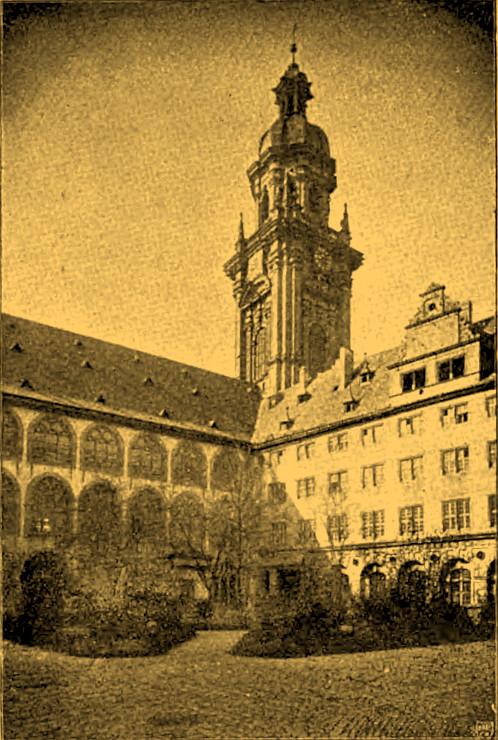
[23] The drawing by Friedrich Tieck?
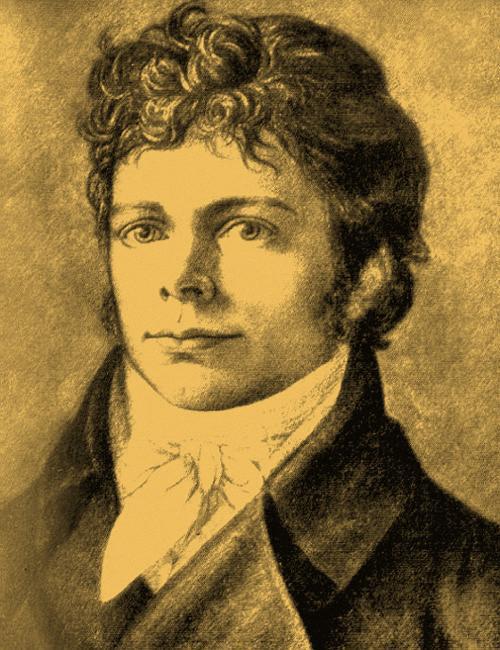
Although Schelling had clearly already departed Würzburg for Munich, as late as two days before Caroline herself left on 20 May 1806 Der Freimüthige oddly still reported that Schelling himself was yet in Würzburg in their apartment:
“Aus Würzburg,” Der Freimüthige oder Ernst und Scherz (1806) 97 (Friday, 16 May 1806), 388:
The departure [from Würzburg] of the Protestant professors Fischer, Hoven, Paulus, and Schelling has by no means been confirmed; to the contrary, all are still here, though no one knows whether the ongoing political crisis or other circumstances have prompted them to changed their decisions.
It is quite certain, for example, that Herr Fischer will be lecturing this semester, since he has already posted such on the announcement board for lectures even though he was quite prepared for departure. One hears that Herr von Hoven is anticipating an appointment in medicine from the new territorial directory in Ansbach, an appointment that has in fact already been approved through the intercession of Count von Thürheim.
Although Herr Dr. Paulus wants to remain here and, having taken the oath, will also be drawing his provisionally approved salary, word has it that along with the few Protestant theological scholars he is not inclined to lecture. Herr Schelling, finally, seems to have decided to stay here after all, all the more so insofar as he has been allowed to remain undisturbed in his rent-free apartment.
Peculiarly, the university secretariat had to disclose to the foreign professors orally that the confirmation of the lecture catalog did not also constitute a confirmation of their positions, and that instead such lecturing was to be viewed merely as provisional and would be left to the discretion of the ultimate will of Serenissimus.
But this entire matter was in fact superfluous, since this condition was already made known at the oath-taking ceremony, and the manner in which this has come about is all the more striking insofar as it is in fact contrary to the normal course of business that would otherwise have required a circular rescript. The reasons for this irregularity are not known; the really harsh element in this stipulation, however, cannot be attributed to Herr President von Wagner (an extremely humane man), since he received it as an explicit order from one knows not whom. Some people say it was intentional, others that it happened quite by accident and that salaries were been paid out to all civil servants this Easter, without reductions, and in part in new Austrian currency. —
That said, the situation of the foreign, especially the Protestant professors, cannot be pleasant; there is some reason to believe, however, that Bavaria will take them on after all, which is certainly to be hoped. Back.
Translation © 2017 Doug Stott
